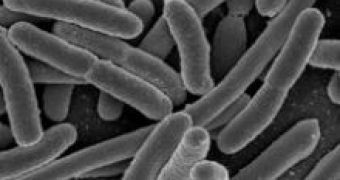Researchers at University of California found out that E. coli mutates only in surprisingly few directions. Theoretically, genetic variability should be governed by purely random mutations. However, E.coli doesn't seem to take chances when serious issues, such as its metabolism, are at stake.
E. coli is one of the most studied bacteria, mostly because it is usually harmless and has a high rate of reproduction. Thus scientists can follow what happens over a large number of generations (if one would want to do the same thing with, say, dogs, one would have to wait hundreds of years). Thus, due to thousands of experiments conducted for decades it is now relatively well known what functions various E. coli's genes serve. Based on this knowledge, the scientists at UCSD managed to make a computer simulation of the behavior of 1,010 of E. coli's 4,200 genes in 15,580 different environments. The result of the simulation is surprising: there is an unexpectedly low variability.
Christian L. Barrett, one of the co-authors of the study: "The goal of this study was to comprehensively simulate all the possible molecular interactions in a well studied strain of E. coli to gain a global view of the range of functional network states. Complex cellular networks can potentially generate lots of different behaviors, but we find that cells utilize only a few of them." Bernhard Palsson, professor of bioengineering at UCSD's Jacobs School of Engineering and co-author of the study: "When it comes to genomes, a great deal of complexity boils down to just a few simple themes. Researchers have confirmed the complexity of individual parts of biochemical networks in E. coli and other model organisms, but our large-scale reconstruction of regulatory and metabolic networks involving hundreds of these parts has shown that all this genetic complexity yields surprisingly few physiological functions. This is possibly a general principal in many, if not all, species."
In other words, there is a lower variability than one would have expected. E. coli doesn't just change itself purely at random; it filters the possible changes in order to exclude some of the potentially disastrous genetic mutations. How exactly does it do it, insofar it remains a mystery. The study that is about to be published in Dec. 27 issue of Proceedings of the National Academy of Sciences takes into account only the behavior of E. coli. The answer to the question "why is it so?" remains to be found.

 14 DAY TRIAL //
14 DAY TRIAL //